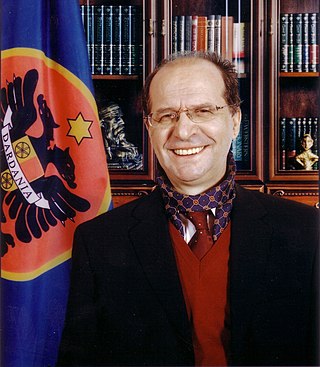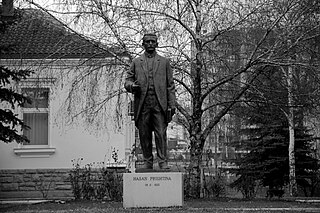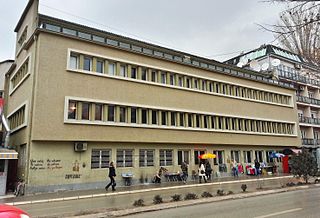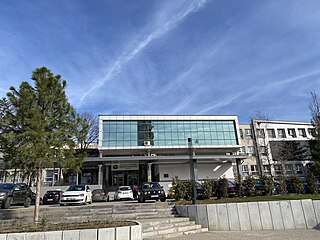Related Research Articles

Ibrahim Rugova was a Kosovo-Albanian politician, scholar, and writer, who served as the President of the partially recognised Republic of Kosova, serving from 1992 to 2000 and as President of Kosovo from 2002 until his death in 2006. He oversaw a popular struggle for independence, advocating a peaceful resistance to Yugoslav rule and lobbying for U.S. and European support, especially during the Kosovo War.

The University of Pristina is a public university located in Pristina, Kosovo. It is the institution that emerged after the disestablishment of the University of Pristina (1969–1999) as a result of the Kosovo War. The inauguration of the university was a historical occurrence not only for the people of Kosovo, but for the whole Albanian nation. On 15 February, the solemn Parliament session took place, which is also proclaimed as The University of Pristina's Day. In the composition of the newly established University of Pristina were faculties with their headquarters in Pristina: the Faculty of Philosophy, Faculty of Law and Economics, Faculty of Engineering and Faculty of Medicine. Now the University of Pristina has 17 faculties, of which 14 are academic faculties and 3 are faculties of applied sciences. Contained within the emblem is a translation of the name into Latin, Universitas Studiorum Prishtiniensis.

Fadil Hoxha was a Yugoslavian ethnic-Albanian communist revolutionary and politician from Kosovo. He was a member of the Communist Party and fought in the Yugoslav Partisans during World War II. After the war, he was the first President of the Executive Council of the Autonomous Region of Kosovo and Metohija (1945–1963) and later member of the Presidency of Yugoslavia (1974–1984).
Afrim Tovërlani is a Kosovar Albanian football coach and a former football player.
The Rochester Institute of Technology Kosovo, previously known as the American University in Kosovo, is a private university located in the Germia district of Pristina, Kosovo. The university was established in 2002 and is part of the Rochester Institute of Technology (RIT) in the Rochester, New York, metropolitan area.

Pristina or Prishtina is the capital and largest city of Kosovo. It is the administrative center of the eponymous municipality and district.

The University of Pristina was founded in the Socialist Autonomous Province of Kosovo, Socialist Republic of Serbia, Yugoslavia, in the city of Pristina, for the academic year 1969–1970 and functioned until 1999. However, owing to political upheaval, war, successive mutual expulsions of faculty of one ethnicity or the other, and resultant pervasive ethnic-based polarisation, there came to be two disjoint institutions using the same name, albeit idiosyncratically to reflect ethnic identity. Albanian-language activity continues at the original location, whilst the Serbian-language University of Priština has relocated to North Mitrovica, where it maintains its place within the Serbian education system.

The National Theatre of Kosovo was founded in 1946 in the city of Prizren, Kosovo. It is the highest ranked theatre institution in the country, with the largest number of productions. The National Theatre is the only public theatre in Kosovo and therefore it is financed by Ministry of Culture, Youth and Sport. This theatre has produced more than 400 premieres which have been watched by more than 3 million spectators.

Education in Pristina, the capital of Kosovo, consists of primary, secondary and higher education. Pristina houses a number of public and private institutions, such as the University "Hasan Prishtina", the National Library of Kosovo, and the Academy of Sciences and Arts of Kosovo. Throughout the last century Pristina has attracted a considerable number of students from Kosovo. Today, the city of Pristina hosts a large number of intellectuals, professors, academics, students, and professionals in various spheres.

The Faculty of Arts of Pristina is the faculty of arts of the University of Pristina, located in Pristina, Kosovo.
Sabit Uka was a Kosovar Albanian author and noted historian.

Education in Kosovo is carried out in public and private institutions. Starting from 1999, education in Kosovo was subject to reforms at all levels: from preschool education up to university level. These reforms aimed at adjusting the education in Kosovo according to European and global contemporary standards. As a first step of this new system is considered the establishment of the Department of Education and Science (DES), which is followed with the creation of legal and professional infrastructure, which should facilitate the fundamental reformation of the education, and the establishment of the Ministry of Education, Science and Technology (MEST) in March 2002. During this period the private education system began to develop.

Universiteti i Mitrovicёs "Isa Boletini" is a public university located in the city of Mitrovica, Kosovo.
Pajazit Nushi was a university professor, psychologist and scientific and social-political worker from Gjakova, Kosova. Member of the Academy of Sciences and Arts of Kosovo.
The History of education in Albania is a crucial component of the cultural, civilizational, and educational thought of the Albanian populace at large. While authentic scientific inquiry into the history of education and Albanian educational philosophy emerged comparatively late, Albanian researchers have made noteworthy contributions. Studies and monographs conducted by these scholars, particularly those undertaken in the latter half of the 20th century through the early 21st century, have illuminated a range of facets pertaining to this subject.

The Faculty of Philology is an academic unit within the University of Pristina. Established in 1988 after gaining independence from the Faculty of Philosophy, its roots can be traced back to the Higher Pedagogical School of Prishtina (1958) and the Faculty of Philosophy (1960).

The University of Gjilan also known as University of Gjilan "Kadri Zeka" - UGJKZ is a public university located in Gjilan, Kosovo. It was originally established as a Pedagogical Academy in 1973 and has since grown into a modern university.
Hajrullah Koliqi (1946) is an Albanian educator, lecturer and university professor from Montenegro.
The Prishtina Normal School was a teachers' college in Kosovo, established on 17 December 1941, during the Italian occupation of Kosovo. It was a cornerstone in the development of the educational system in Kosovo and in the region. Initially created to address the critical need for qualified teachers in Kosovo's Albanian schools, the institution quickly became a vital academic, educational and cultural hub. Over the years, it played a significant role in training educators and fostering intellectual growth, leaving a lasting legacy through its distinguished alumni and contributions to Kosovo's educational system. Between 1946 and 1953, the school operated in Gjakova. The Prishtina Normal School ceased to exist in 1974.
The Pedagogical Institute of Kosovo (PIK) is a professional research and educational institution established in 2007, with its headquarters in Prishtina. PIK plays a crucial role in the development and improvement of the educational system in Kosovo, focusing on enhancing the quality of education through teacher training, curriculum development, and educational research.
References
- ↑ Halimi, Destan, ed. (2016-08-24). "University of Prishtina (1970-2005)" (in Albanian and English). Archived from the original on 2016-08-24. Retrieved 2024-02-14.
- ↑ White, Cameron; Saqipi, Blerim (2020-10-06). Intercultural Education: Kosovo Stories of Struggle and Resilience. Vernon Press. ISBN 978-1-64889-077-2.
- ↑ F, G (2021-02-15). "15 shkurt 1970, themelohet Universiteti i Prishtinës - Gazeta Fjala". fjala.al (in Albanian). Retrieved 2024-02-15.
- ↑ Kostovicova, Dr Denisa (2005-10-09). Kosovo: The Politics of Identity and Space. Routledge. p. 42. ISBN 978-1-134-27632-5.
- ↑ Hetemi, Atdhe (2020-01-01). "The political and national character of institutions of higher education and the University of Prishtina in Kosovo (1958–1980)". Routledge Journal of the History of Education Society.
- ↑ "A university for 50 years". Kosovo 2.0. 2019-10-31. Retrieved 2024-02-15.
- ↑ KEC. "Shifra dhe fakte për arsimin në Kosovë" [Codes and Facts about education in Kosovo](PDF) (in Albanian). Prishtina: Kosova Education Center. p. 41. Archived from the original (PDF) on 2007-10-25. Retrieved 2024-02-15.